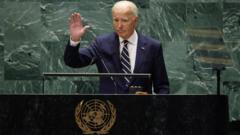US President Joe Biden has spent nearly a year vowing his determination to prevent the war in Gaza engulfing the wider Middle East. On Tuesday, he repeated that resolve in his last ever United Nations speech as president, as he addressed the fighting between Israel and Hezbollah in Lebanon.
“A diplomatic solution is still possible. In fact, remains the only path to lasting security,” Biden said.
“Full scale war is not in anyone’s interest,” he added.
But the Israel-Lebanon crisis is now on the brink.
And Biden’s calls for restraint from the podium of the UN, like his pleas for Israel and Hamas to finally reach a ceasefire and hostage release deal, are being heard in the hall but not in the region.
On Monday, Israel unleashed hundreds of airstrikes on Lebanon, inflicting the deadliest day on the country since the end of its bloody, sectarian civil war more than three decades ago. Israel’s bombardment killed more than 500 people, according to Lebanese health officials.
Hezbollah, the Iran-backed armed group that dominates the country – reeling and damaged from Israel’s wave of exploding pager attacks last week – launched hundreds of rockets into northern Israel, smashing homes and setting streets ablaze.
Once again the US is trying to restrain Israel, the key regional ally it arms, and urging its adversaries against escalating too, all the while seeking a diplomatic outcome that the sides themselves lack either the ability or will to agree.
Israel says it’s acting to disarm the Lebanese militia so Israeli residents can return to their homes in the north. Hezbollah says it’s been striking Israel for the past 11 months to deter and degrade Israeli attacks on Palestinians in Gaza. Months of shuttle diplomacy by the US envoy Amos Hochstein – building on already established UN Security Resolutions on Israel and Hezbollah – have come to nothing.
Instead, in another split screen moment as Biden was urging calm at the podium at the UN, the Israeli Prime Minister Benjamin Netanyahu posted a video on X vowing: “We will continue to hit Hezbollah. He who has a missile in his living room and a rocket in his garage – he will not have a home.”
The White House supports what it calls Israel’s right to hit Hezbollah. But the often dysfunctional political relationship with the Israeli leadership has again become apparent over recent weeks, amid serious concerns in the administration that the exploding pager attacks and subsequent Israeli airstrikes could lead to all out war.
No call between Biden and Netanyahu was announced despite the crisis of the last week. US Secretary of State Antony Blinken recently made his tenth trip to the region since the 7 October attacks but for the first time did not visit Israel. Critics both within and outside the administration have repeatedly blamed an inability of the White House to wield influence over Netanyahu on a failure to condition US weapons supply. The administration categorically rejects this, saying it is committed to Israel’s defence.
President Biden always believed the key to solving the crisis on the Israel-Lebanon border, involving 11 months of cross border fire and tens of thousands of people displaced on either side, was instead clinching the ceasefire deal in Gaza. But this is badly stalled with few signs either side is willing to reach it. Blinken recently pinned this on a lack of “political will” by both Israel and Hamas.
The White House denies that it is pursuing a diplomatic effort doomed to defeat – and that President Biden, with four months left in office, has given up hope of achieving a breakthrough.
“No, he absolutely hasn’t given up,” White House National Security Advisor Jake Sullivan said of Biden’s attempts to reach a deal that would end the war in Gaza.
“There have been difficulties and setbacks. We’ve had challenges getting the [Israeli] prime minister across the line. We’ve had challenges getting Hamas’s leader Sinwar across the line. But we’re determined to keep at it,” Mr Sullivan told CNN.
“The president this week in New York will be huddling with other leaders to try to bring about a ceasefire and hostage deal in Gaza and really critically, to try and avert an all-out war in the Middle East.”
Behind the scenes here in New York, a stream of diplomacy is taking place. According to a senior state department official, the US is presenting allies with potential plans to resolve the crisis between Israel and Hezbollah.
“We’ve got some concrete ideas we’re going to be discussing with allies and partners this week to try to figure out the way forward on this,” said the official who spoke on condition of anonymity.
Pressed on what the “concrete ideas” were, the official would not be drawn, noting instead that while the US does not speak directly to Hezbollah, some of its allies gathered in New York do and these partners “might have a more refined sense of Hezbollah thinking so we can stress test our ideas.”
But the official also renewed US opposition to any Israeli ground invasion of Lebanon. And they rejected Israeli officials’ reported belief that ramping up the conflict with Hezbollah could force them into cutting a diplomatic deal that would stabilise the situation on either side of the Israel-Lebanon border – a strategy referred to as “de-escalation by escalation”.
“I can’t recall, at least in recent memory, a period in which an escalation or intensification led to a fundamental de escalation and led to profound stabilisation of the situation,” said the official.

